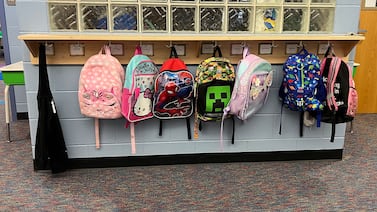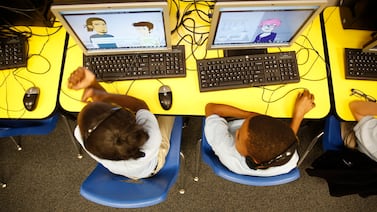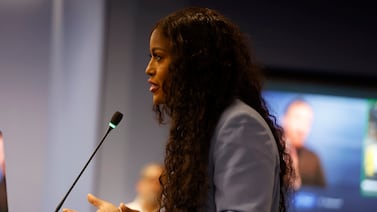A year after Colorado lawmakers denied employees of school districts and public universities the right to unionize and negotiate contracts, legislators are considering a bill that would provide some protections for them and other public sector employees.
Senate Bill 111 would extend rights for public employees who openly express views about the workplace, start the process of forming a union, or participate in organizing. Public workers would also be protected from retaliation, discrimination, and intimidation from employers. Private sector employees already have these rights under federal law.
The bill doesn’t require public employers to recognize unions or grant workers the ability to strike. But the legislation, which a Senate committee advanced Tuesday, could represent a notable step forward for K-12 and higher education workers who want stronger labor protections for what they say are crucial workplace rights.
Critics who united to exclude education staff from a law expanding collective bargaining rights last year say this year’s legislation is unnecessary, unfair to employers, and would hurt schools.
Jade Kelly, CWA Local 7799 president, said the bill extends some rights granted to private employees through the National Labor Relations Act, a 1935 law to ensure workers can advocate for better conditions and form labor unions without retaliation. Her union represents higher education workers, library workers, and public defenders, among others.
She said public employees do have certain rights under federal statutes. But Kelly said that employers often violate those laws because a federal complaint must be filed by workers when there are issues. It’s a difficult process that creates hostile work environments where public employees feel they can’t speak out, she said.
Kelly said filing a complaint is expensive and takes up a lot of time and “employers know that.”
By extending the federal rights for private workers to public workers statewide, the bill would ensure the Colorado Department of Labor & Employment enforces these rights and step in when violations happen, mediate any issues, and take action.
Democrats in the state legislature have been pushing for more rights for public sector workers. The legislation lawmakers passed last year grants county employees the right to organize and bargain collectively over pay and working conditions. That law also prohibits strikes, work stoppages, and work slowdowns.
But facing stiff opposition from school district administrators, school boards, higher education officials, and Democratic Gov. Jared Polis, education workers were excluded from last year’s bill.
Senate Bill 111 is sponsored by state Sen. Robert Rodriguez and state Rep. Steven Woodrow, both Denver Democrats. The bill passed the Senate Local Government and Housing Committee on Tuesday with a partisan 4-3 vote.
Many large Colorado school districts voluntarily recognize employee unions and have contracts that include collective bargaining rights, but there is no requirement that they do so. Union members say that leaves many teachers vulnerable.
Mountain Valley School District teacher Kevin Walek, a San Luis Valley teacher union vice president, said teachers worry if they speak out that school district leadership will punish them. Many teachers like him are within their first few years of teaching and on a probationary period.
The bill would help teachers feel like they can use their voice.
“A lot of teachers just keep their head down,” Walek said. “It’s a tough environment.”
In addition to K-12 and higher education workers, the bill would cover a large group of workers, such as county, city, fire, library and public health workers.
The Colorado Education Association and other advocacy groups say the bill grants rights and protections that were skipped over in last year’s collective bargaining bill for many public employees.
Multiple groups want to amend the bill, including the Colorado League of Charter Schools, the Colorado Association of School Executives, and the Colorado Charter School Institute. The committee approved amendments related to unintended consequences the groups identified, such as those related to State Board of Education powers and to ensure management positions wouldn’t be included.
Michelle Murphy, Colorado Rural Schools Alliance executive director, said the bill would substantially disrupt schools. The organization also wants to amend the bill.
“This bill expands employee rights while dialing back and restricting employer rights,” she said.
Opponents include many county and city organizations and governments. Kevin Bommer, Colorado Municipal League executive director, said employers are already required to give employees substantial protections under federal law.
Others also argued there aren’t widespread complaints about improper employer practices. And any such issues can be handled by federal law, they said.
But Kelly said the public ultimately gets hurt when unhappy workers can’t resolve issues quickly with their employers.
“Workers end up leaving or they get to the point where they hate their jobs,” Kelly said. “That creates an adverse effect on anyone who uses public services.”
Jason Gonzales is a reporter covering higher education and the Colorado legislature. Chalkbeat Colorado partners with Open Campus on higher education coverage. Contact Jason at jgonzales@chalkbeat.org.







